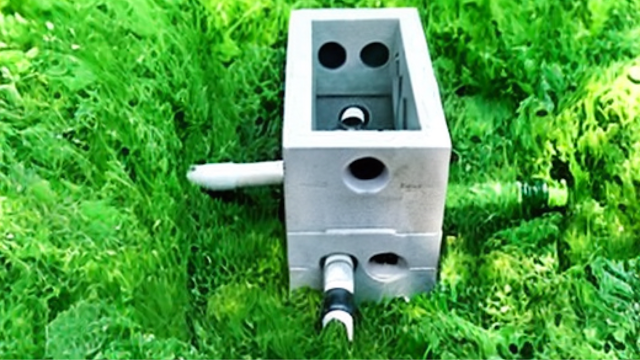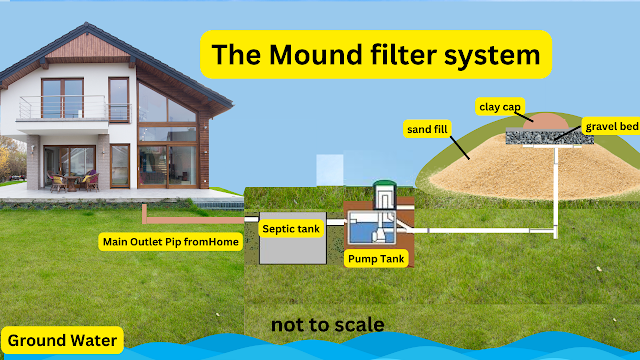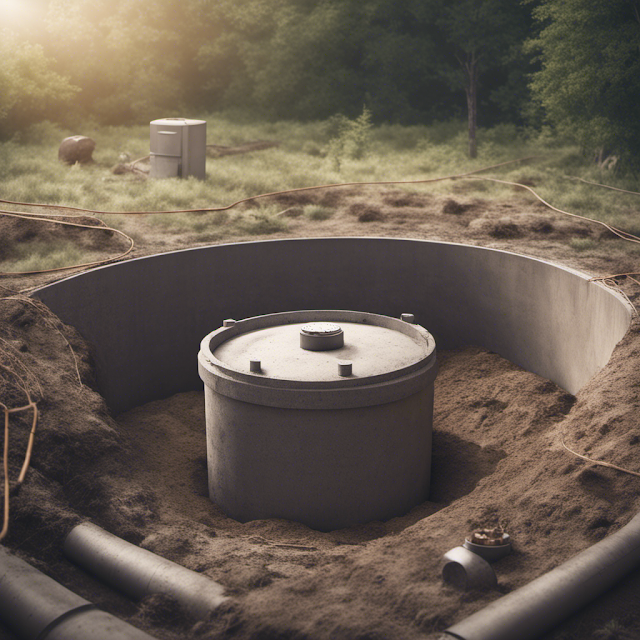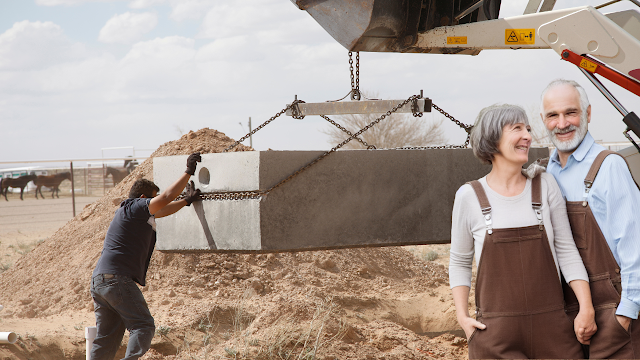Shocking Fines for Illegal Septic System in Texas: Don't Get Caught!
 |
| fines for illegal septic system in texas |
Are you a Texas homeowner using an illegal septic system to save a few bucks? If so, beware as the state of Texas imposes hefty fines for using such a system to dispose of waste. An illegal septic system is one that has not been permitted or designed to meet the state's regulations.
Most people may not know what is an illegal septic system and how it can impact their homes. However, using an unpermitted or illegal system can cause major environmental damage to the homeowner's property, neighbors' property and even surrounding bodies of water. It can lead to serious health risks and pollution that affects the community and beyond.
If you suspect you may have an illegal septic system, it is becoming increasingly important to ensure you have it assessed and, if necessary, replaced with one that meets Texas' septic regulations. The state imposes fines that, over time, can become significant and lead to more extensive repairs or penalties.
Fines for Illegal Septic Systems in Texas
Septic tanks are an essential part of many residential homes in Texas. They are designed to treat and dispose of wastewater from the household. However, some homeowners might intentionally or unintentionally violate state laws by installing or maintaining an illegal septic system. An illegal septic system is a system that does not comply with the state's regulations and poses environmental and public health hazards.
So what is an illegal septic system? It could be a septic system that was installed without a permit, or a system that does not meet the state's requirements. For example, a septic system that is too close to a water source, or a system that is not maintained correctly, might be considered illegal.
The state of Texas takes the issue of illegal septic systems very seriously and imposes strict fines for violators. The fines vary, depending on the severity of the violation.
In Texas, if you violate the septic system regulations, you may be fined up to $10,000 per day of violation until the issue is resolved. On top of that, you could be required to pay for the cost of repairs and maintenance to bring the septic system into compliance with the law. The state can also issue administrative penalties to violators, which range from $50 to $10,000 per day of violation.
Moreover, if an illegal septic system causes environmental damage, the violator may face additional fines. The state of Texas also has the right to order the removal of the illegal septic system and install a compliant one at the owner's expense.
It is the responsibility of every homeowner to ensure that their septic system meets the state's requirements. To avoid facing heavy fines for owning an illegal septic system, homeowners should contact their local health department and make sure their system is up-to-date and complies with the state's regulations.
In summary, an illegal septic system can lead to heavy fines and administrative penalties if not taken seriously. Therefore, it is essential for homeowners to ensure that they have a legal and compliant septic system.
What is a Septic System?
A septic system is a self-contained wastewater treatment system that is used in rural or remote areas where there are no municipal sewage systems. A septic system consists of a large underground tank where all the wastewater from a household is collected and then treated through a natural process. The effluent that is produced by a septic system is then absorbed by the soil and returned to the environment.
An illegal septic system is one that has been installed or is being operated without the necessary permits or in violation of environmental regulations. Many homeowners may not be aware of the fact that their septic systems are illegal, as they may have purchased their homes with the system already in place.
There are several reasons why a septic system may be considered illegal, including inadequate permitting, improper installation, and failure to meet current environmental regulations. Often, illegal septic systems can pose a serious risk to public health and the environment. For example, if a septic tank is not properly maintained, sewage can leak into the surrounding soil and streams, polluting the local water supply and causing serious health problems.
In Texas, septic system regulations are enforced by the Texas Commission on Environmental Quality (TCEQ). Property owners are required by law to obtain a permit from the TCEQ before installing or repairing a septic system. The TCEQ also sets standards for septic system design, installation, and maintenance to ensure that they are functioning properly and not causing harm to the environment.
If you have questions about septic systems or suspect that your system may be illegal, it is important to contact a licensed professional. In addition, if you are considering purchasing a property with a septic system, be sure to have it inspected by a professional to ensure that it is functioning properly and meets all regulatory requirements.
Legal Requirements for Septic Systems in Texas
To avoid facing fines, it is essential to understand the legal requirements for septic systems in Texas. In Texas, septic systems must meet several criteria to minimize health risks and prevent contamination of surrounding watersheds. Here are some of the requirements for a septic system to be considered legal in Texas:
The septic system must be designed by a licensed engineer and installed by a licensed installer.
The septic system must comply with county and state regulations.
The septic system must have a minimum distance of five feet from the property line, 10 feet from a water well, and 100 feet from a public water supply source.
The septic system must be inspected by a licensed professional every year and must be pumped every one to three years depending on usage and size of tank.
The septic system must have proper sizing of the tank for the number of bedrooms in the house.
Having an illegal septic system in Texas can result in hefty fines and legal trouble. So, what is an illegal septic system? An illegal septic system, simply put, is any septic system that does not comply with state and county laws and regulations. Common violations include discharging untreated wastewater onto the ground, improper sized tank or leach field, and not obtaining the necessary permits before installation.
In Texas, fines for illegal septic systems can range from a few hundred dollars to tens of thousands of dollars depending on the severity of the violation. Additionally, failing to comply with state and county regulations can result in serious health risks, including contamination of drinking water sources and negative effects on the environment.
It is important to note that homeowners are responsible for the maintenance and upkeep of their septic systems. By regularly maintaining and cleaning their septic systems, homeowners can prevent health risks, avoid legal trouble, and prolong the life of their septic system.
In conclusion, adhering to legal requirements is crucial to maintaining a safe and compliant septic system in Texas. Understanding and following these regulations helps prevent health risks, avoid legal trouble, and protect the environment.
Understanding the risks associated with an illegal septic system is crucial, especially if you're a homeowner in Texas. In basic terms, an illegal septic system is a system that doesn't comply with the rules and regulations of the Texas Commission on Environmental Quality (TCEQ). This could be due to unsanitary conditions, inadequate design, or improper construction. To put things into context, a septic system that discharges untreated waste into the environment, contaminates groundwater or surface water, or poses a threat to public health or the environment can be considered illegal.
With that said, failing to comply with the regulations put in place by the TCEQ for septic systems can have serious consequences. Homeowners who fail to obtain the proper permits or install systems that don't meet the necessary standards can be subject to fines and penalties. In fact, violations related to septic systems are some of the most commonly cited violations in the state of Texas.
The penalties for failing to comply with regulations can vary depending on the severity of the violation. In general, homeowners can expect to pay fines ranging from several hundred to several thousand dollars for each day that they are out of compliance. Moreover, those who violate TCEQ rules may be subject to other penalties, such as mandatory repair or replacement of the system and possible litigation if the violation causes property damage or bodily injury to others.
It's important to note that the TCEQ takes illegal septic systems very seriously. The commission has the authority to impose civil and criminal penalties, as well as to require remediation of environmental harm caused by illegal systems. As such, it's highly recommended that homeowners ensure their septic systems are in compliance with all relevant regulations and that they contact their local health department or TCEQ office for further assistance if they suspect their system may be illegal.
In summary, an illegal septic system is one that doesn't comply with TCEQ rules and regulations for septic systems. Violations related to septic systems are serious and can lead to fines, property damage, and harm to the environment. As a homeowner in Texas, it's essential to take all necessary steps to ensure your septic system is legal and compliant.
How to Identify an Illegal Septic System
If you own a property in Texas, it's important to ensure that your septic system complies with the laws and regulations. An illegal septic system can lead to hefty fines, legal troubles, and potential health hazards.
So, what is an illegal septic system? Well, an illegal septic system can take many forms, but generally, it's a system that's not up to code and that poses environmental, health, or safety risks. Here are some ways to identify an illegal septic system:
Lack of permits: If your septic system was installed without proper permits, it's likely an illegal system. Be sure to check with your local authorities to ensure that you have all the necessary permits for your septic system.
Visible signs: In some cases, you can identify an illegal septic system through visible signs such as broken pipes, sewage backups, standing water, or foul odors. If you notice any of these signs, it's crucial to address the issue quickly to avoid further damage.
Age and condition: If your septic system is too old or in poor condition, it may not comply with the current regulations. Most septic systems have a lifespan of around 25 years, so if your system is older than that, it's worth having it inspected to ensure that it's still functioning properly.
Location: In Texas, septic systems are subject to zoning and permitting regulations. It's essential to ensure that your system is installed in an approved location and that it's not encroaching on your neighbor's property or public land.
In summary, identifying an illegal septic system can be difficult, but it's essential to ensure that your septic system complies with all the necessary laws and regulations. By understanding what to look for, you can take steps to address any issues and avoid fines and legal troubles.
Steps to Take if You Suspect an Illegal System
If you suspect that someone is using an illegal septic system in Texas, it's important to take immediate action. First, it's crucial to understand what constitutes an illegal septic system.
An illegal septic system is an on-site sewage facility (OSSF) that has been installed or modified without the proper permits or approvals from regulatory agencies. This can include systems that are not in compliance with current laws or regulations, or those that may pose a risk to public health and the environment.
If you suspect that someone is using an illegal septic system on their property, here are the steps you can take:
Contact the Local Health Department - The local health department is responsible for monitoring, regulating, and enforcing septic system laws in many areas of Texas. They can investigate your concerns and take necessary actions to ensure compliance with regulations and laws.
Provide Detailed Information - When you file a complaint, provide all relevant details to the health department. This can include the name and address of the property owner, the location of the suspected system, and any other relevant information you may have.
Report your Concern Anonymously - If you are concerned about possible retaliation from the property owner, you can file a complaint anonymously. Many health departments will allow you to submit a complaint without leaving your personal information.
Follow up on the Complaint - After you file a complaint, follow up with the health department to ensure that they are taking appropriate action. The health department may require additional information from you or may need access to your property to investigate.
Consult a Professional - If you suspect an illegal septic system on your own property, consult with a professional septic system installer or inspector. They can help you identify any issues and recommend appropriate solutions for remediation.
By taking these steps, you can help ensure that illegal septic systems in Texas are identified and properly addressed. Remember, illegal septic systems can pose serious health and environmental risks and should be reported immediately.
Why Avoiding an Illegal Septic System is Important
Having an illegal septic system on your property can lead to serious legal and financial consequences. Before we dive into the specifics of avoiding an illegal septic system, let's first define what it is.
An illegal septic system is one that is not up to code or has been installed without the necessary permits. This can happen when property owners try to save money by cutting corners or when they neglect to follow the proper procedures. Illegal systems can also result from improper maintenance or repairs of an otherwise legal system.
Now, let's examine the reasons why avoiding an illegal septic system is important:
Legal Consequences: Property owners with illegal septic systems can face hefty fines and legal action. According to the Texas Commission on Environmental Quality, a property owner with an illegal system can face penalties of up to $10,000 per violation, per day. Additionally, property owners may be required to remove the illegal system and install a new, legal system.
Health Risks: Illegal septic systems can pose significant health risks to you and your community. Improperly treated wastewater can seep into the ground, contaminating nearby wells, lakes, and rivers. This can lead to outbreaks of dangerous illnesses such as E. coli, hepatitis, and cryptosporidium.
Property Value: An illegal septic system can have a negative impact on your property's overall value. Prospective buyers may be hesitant to invest in a property with an illegal system due to the potential for legal and health problems.
Environmental Impact: Illegal systems can contribute to environmental pollution and damage. Improperly treated waste can harm the local ecosystem by killing off animal and plant life and polluting water sources.
In conclusion, avoiding an illegal septic system is crucial for legal compliance, health and safety, property value, and environmental protection. Make sure to consult with a qualified professional before installing, repairing, or maintaining your septic system.
As we wrap up this article on fines for illegal septic systems in Texas, it's essential to understand what an illegal septic system is. Simply put, an illegal septic system is a system that doesn't adhere to the state's regulations on wastewater management and disposal. These systems are often installed without obtaining the necessary permits from local authorities or even designed as per the required standards.
Illegal septic systems pose a significant risk to human health and the environment. They can contaminate water sources, spread diseases and endanger wildlife. It's no wonder the state enforces strict penalties and fines for those who install or use them.
If you suspect that you are using an illegal septic system or aren't sure about the status of your system, it's crucial to reach out to the appropriate authorities to get a proper assessment. Ignoring it can lead to severe environmental, health, and financial consequences.
So, whether you're a property owner, contractor, or any other party involved in the installation or use of septic systems in Texas, always ensure that everything is done according to the state's regulations to avoid fines and legal problems.
https://www.epa.gov/septic/septic-systems-reports-regulations-guidance-and-manuals
https://www.epa.gov/septic/how-septic-systems-work
.png)





.png)




Comments
Post a Comment